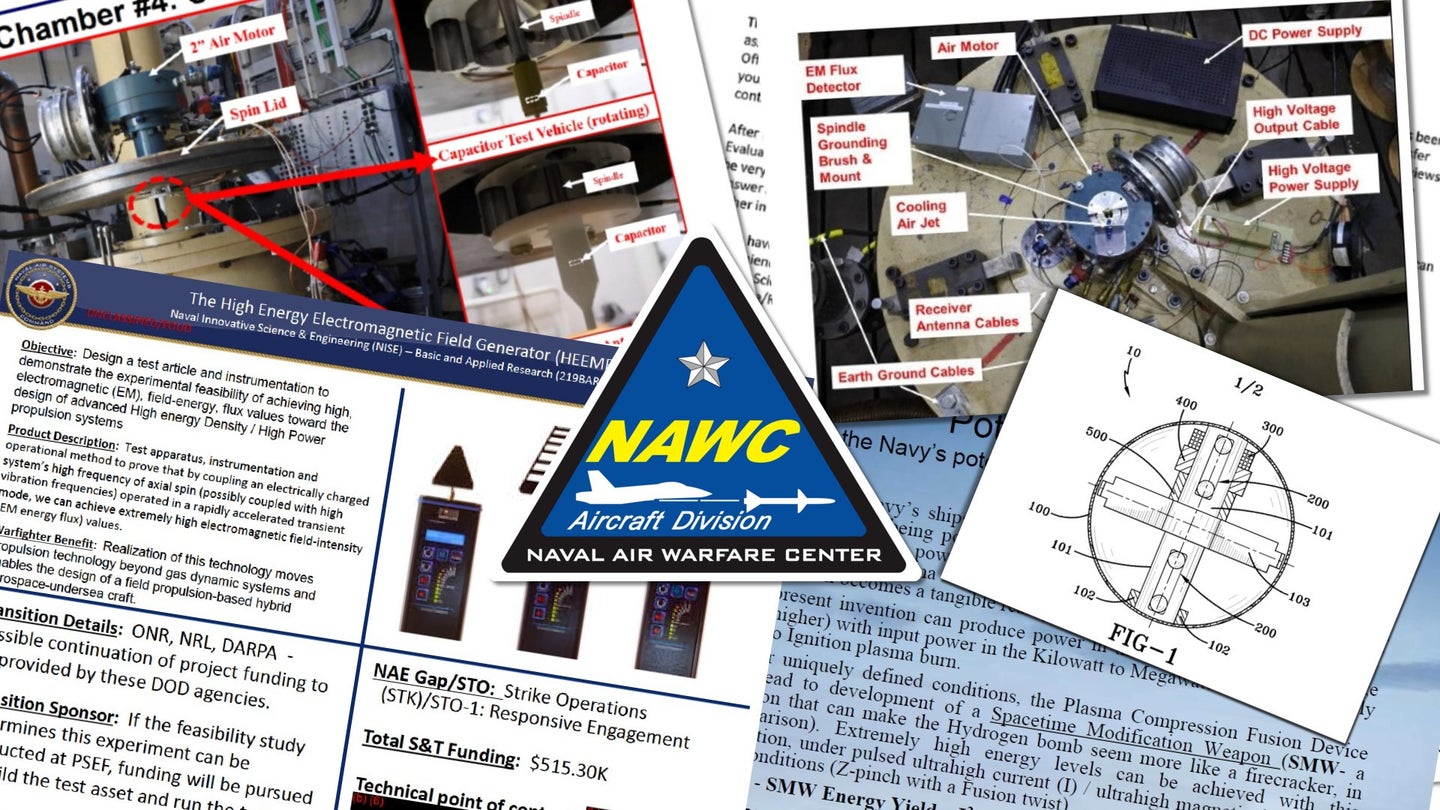
The War Zone's most recent report on the strange circumstances surrounding these patents underlined that there were indeed some type of physical experiments conducted related to them, even if very limited. Now, new Freedom of Information Act releases provide unprecedented insights not just into how seriously the Navy took Dr. Pais's work, but also exactly how elements of it were actually tested at the cost of hundreds of thousands of dollars and where the program may have ended up. The materials even include mention of a "Spacetime Modification Weapon (SMW- a weapon that can make the Hydrogen bomb seem more like a firecracker, in comparison)."
The releases, which are all related to a Naval Innovative Science and Engineering – Basic & Applied Research Program under the project name “The High Energy Electromagnetic Field Generator (HEEMFG),” contain hundreds of pages containing detailed technical drawings, photographs, and data related to actual tests of the HEEMFG. The system was meant to evaluate the feasibility of Dr. Salvatore Pais’s claimed “Pais Effect.” If you haven’t yet read about the ongoing saga of the enigmatic Dr. Pais and the science-fiction-like inventions he made on behalf of the Navy, be sure to get caught up on our previous reporting linked in order from the first to most recent here, here, here, here and here.
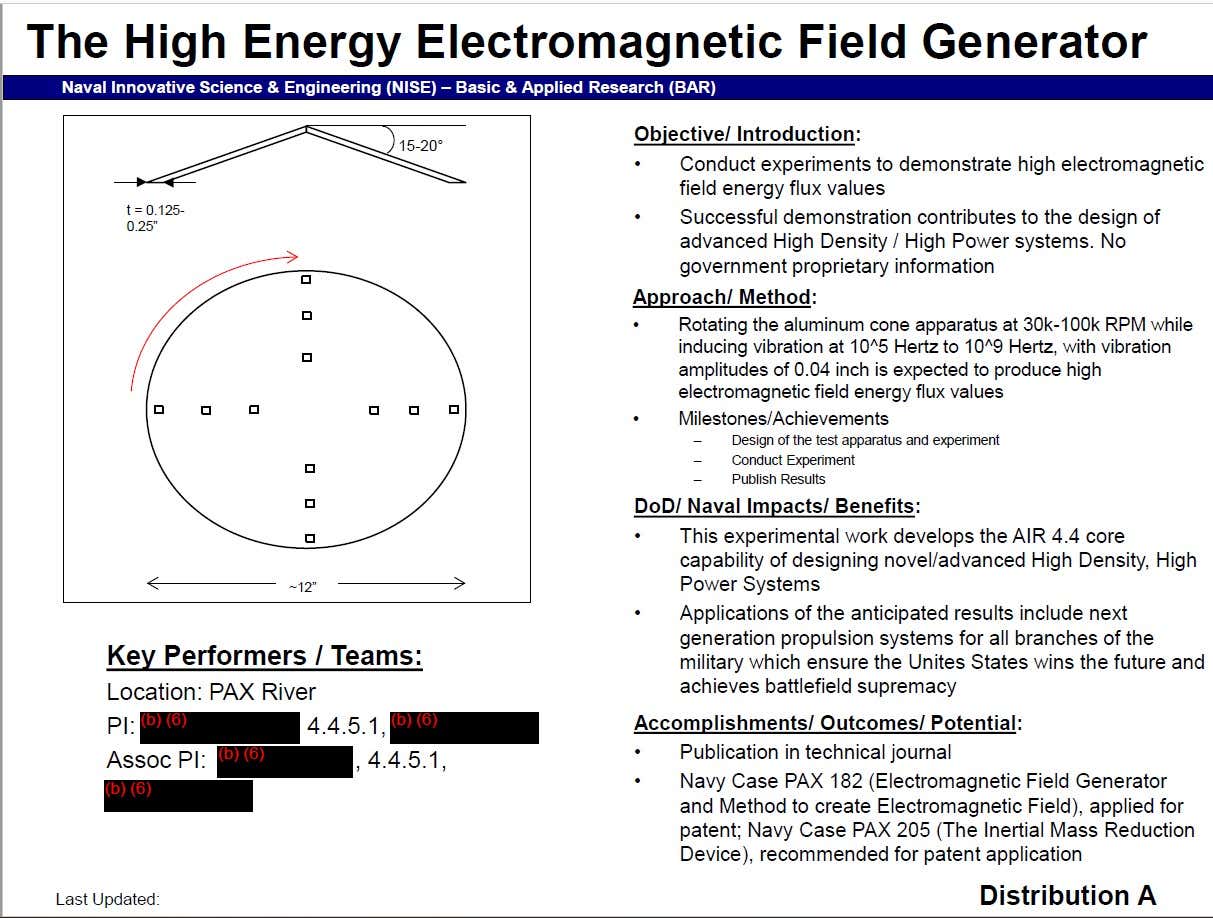
Each one of Dr. Pais's inventions is stated to be enabled through what he himself described to The War Zone as "the Pais Effect," a theoretical physics concept that is claimed to be enabled through the “controlled motion of electrically charged matter (from solid to plasma) via accelerated spin and/or accelerated vibration under rapid (yet smooth) acceleration-deceleration-acceleration transients.” This effect, the inventor claims, can lead to incredibly powerful electromagnetic energy fields that can “engineer the fabric of our reality at the most fundamental level” leading to incredible revolutions in power and propulsion, quantum communications, energy production, and even weaponry.
These latest internal documents, which The War Zone obtained through the Freedom of Information Act (FOIA), show that NAWCAD felt this technology has “National Security importance in leading to the generation of thermonuclear Fusion Ignition Energy with commercial as well as military application potential, in ensuring National Energy Dominance.”
In addition, the documents contain the Basic and Applied Research (BAR) proposal that was submitted to secure funding and resources for the test of Pais’s High Energy Electromagnetic Field Generator concept. In all, it appears at least $466,810 was devoted to the project between Fiscal Years 2017 and 2019 — far more than what was previously thought.
Many of the documents also state that the HEEMFG project could be further continued by the Office of Naval Research (ONR), the Naval Research Laboratory (NRL), the Air Force Research Laboratory (AFRL), NASA, or even the Defense Advanced Research Projects Agency (DARPA). At this time, it is unknown if the HEEMFG transitioned to other DoD agencies, but The War Zone is pursuing FOIA requests related to any possible collaborative transition. Another slide (below) indicates ONR, NRL, and DARPA as likely candidates for transition or collaboration.
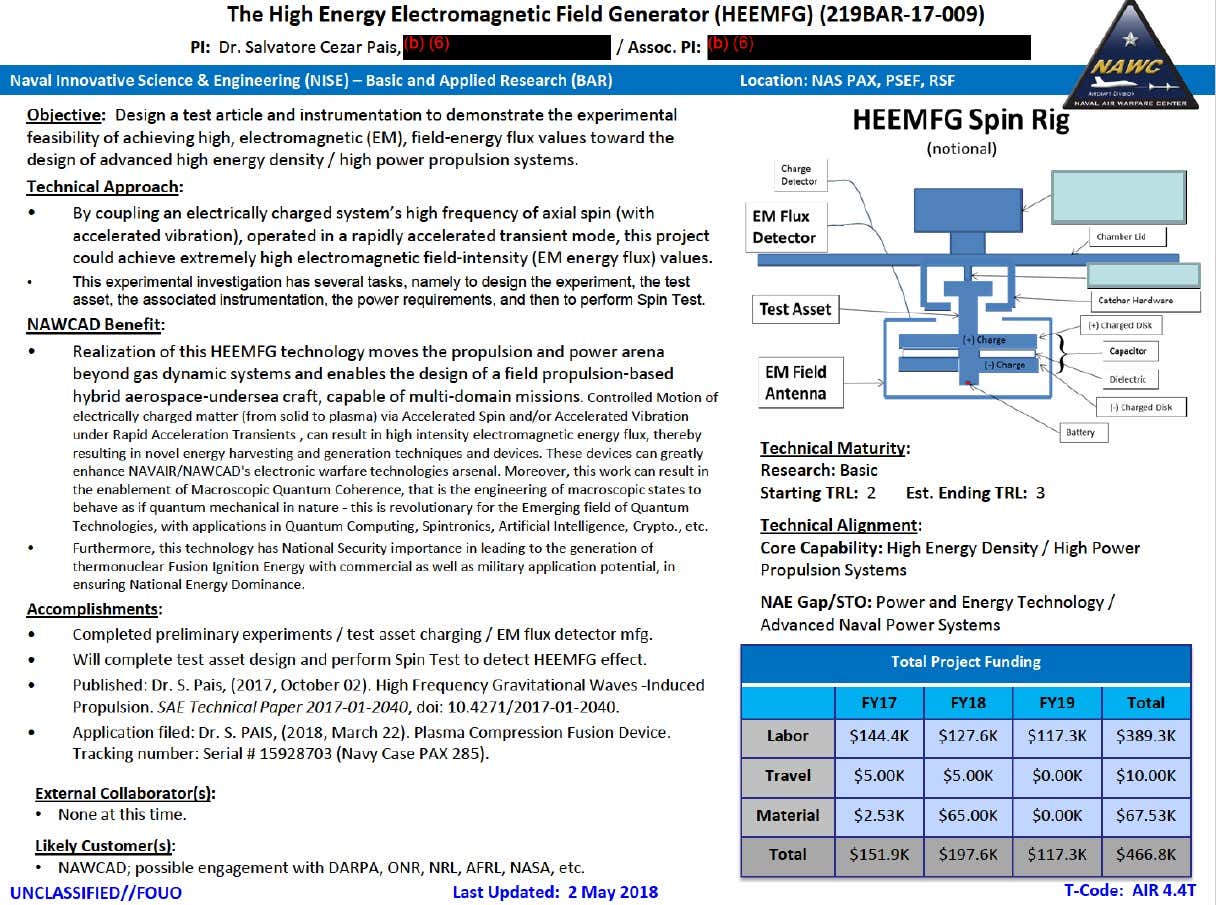
The documents also show that a team of at least 10 technicians and engineers were assigned to design and test an experimental demonstrator and that testing was being conducted as recently as September 2019.
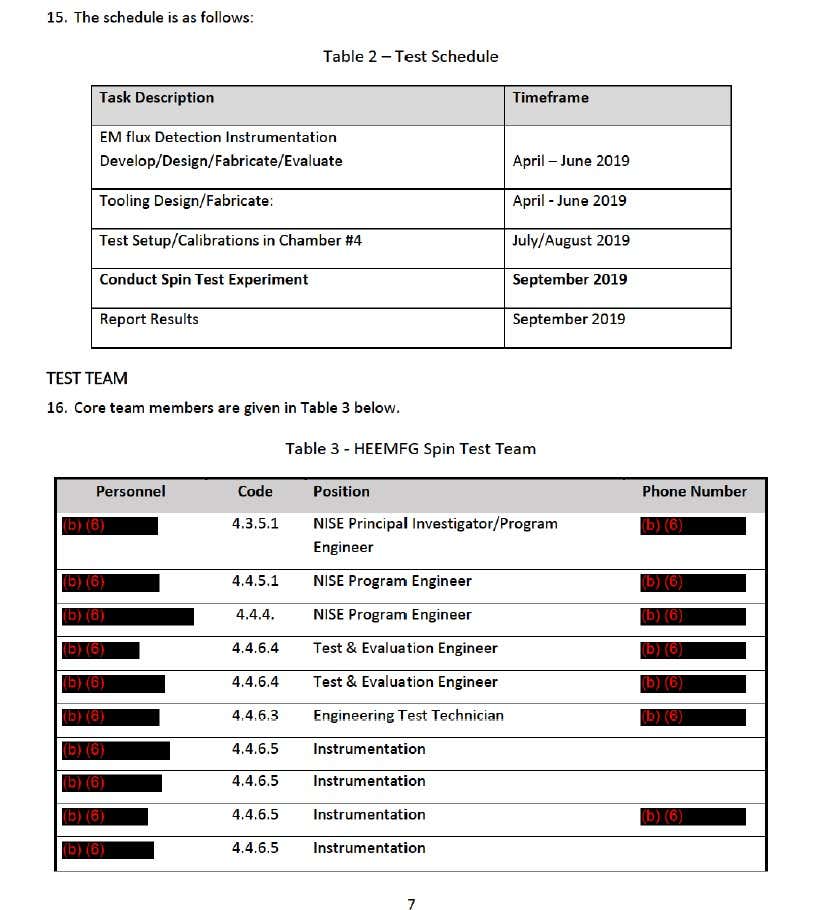
Over 1,600 hours of work were conducted in 2018 and 2019 on the project between design, procurement, manufacture, testing, and assembling final reports and technical papers.
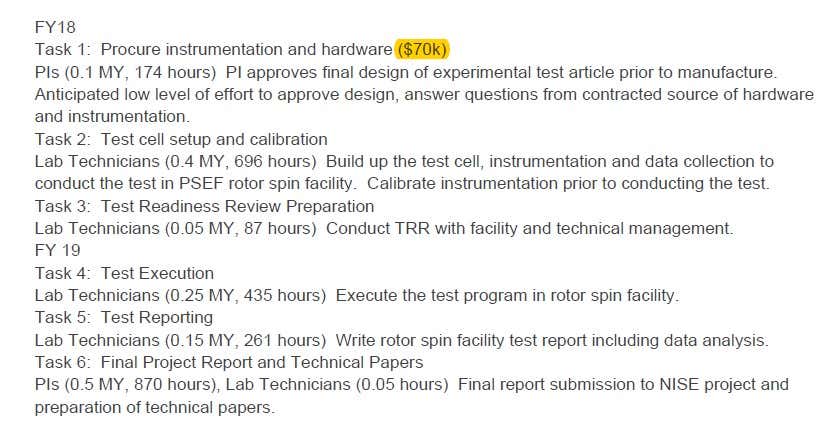 Many of the documents describe the tests of the High Energy
Electromagnetic Field Generator (HEEMFG) and the data that resulted.
Some of these documents describe specific “Identified Technical
Obstacles” and proposed solutions for developing a working HEEMFG
device. One test asset used in experiments appears to have been a “coin
cell capacitor” with a 0.276-inch diameter, which was connected to a
vertical drive spindle and spun up to 100,000 rotations-per-minute (RPM)
with a 2-inch air motor. Other experiments describe spinning a 12-inch
disk featuring piezoelectric elements arranged in a cruciform (cross- or
x-shaped) arrangement. These larger discs were charged with much larger
capacitors.
Many of the documents describe the tests of the High Energy
Electromagnetic Field Generator (HEEMFG) and the data that resulted.
Some of these documents describe specific “Identified Technical
Obstacles” and proposed solutions for developing a working HEEMFG
device. One test asset used in experiments appears to have been a “coin
cell capacitor” with a 0.276-inch diameter, which was connected to a
vertical drive spindle and spun up to 100,000 rotations-per-minute (RPM)
with a 2-inch air motor. Other experiments describe spinning a 12-inch
disk featuring piezoelectric elements arranged in a cruciform (cross- or
x-shaped) arrangement. These larger discs were charged with much larger
capacitors.
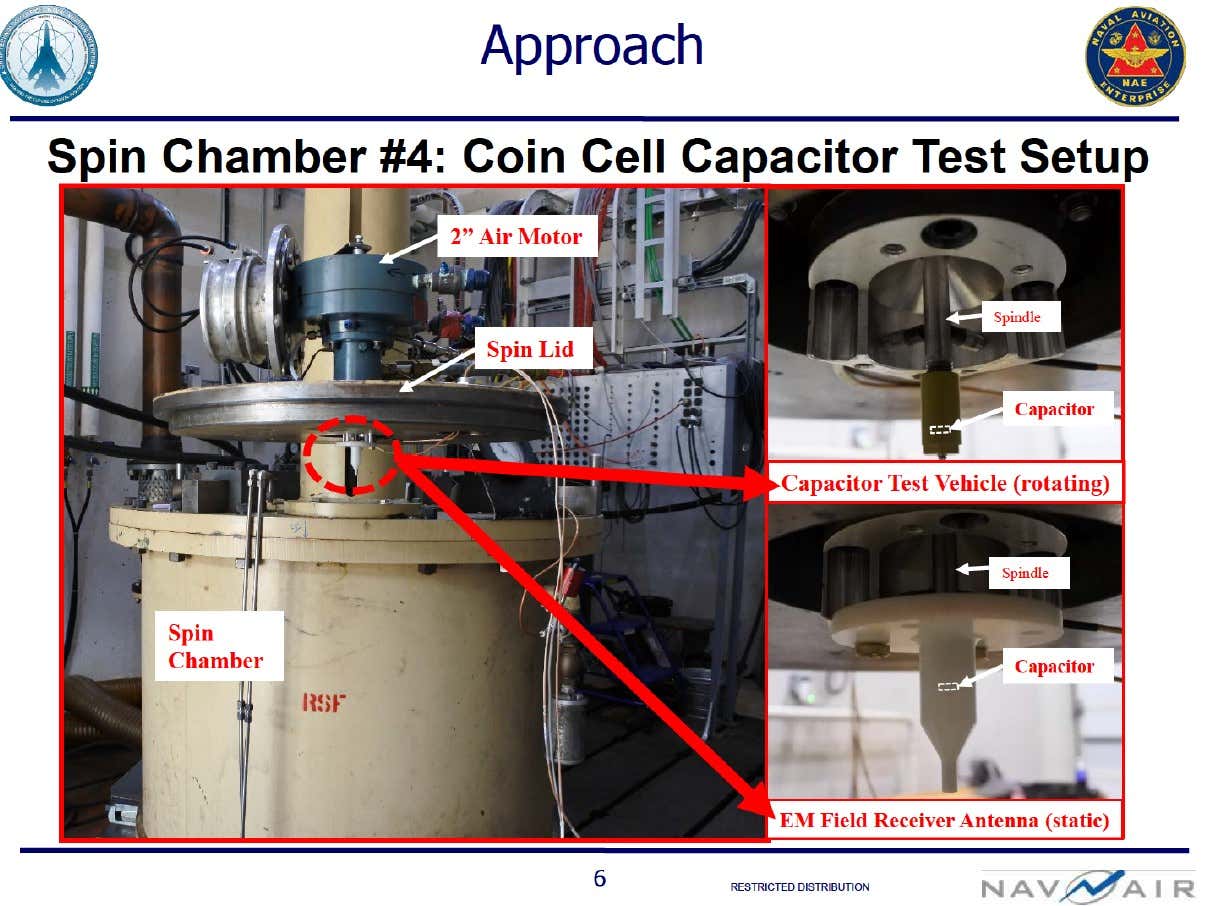
The devices tested appear to have been benchtop versions of Pais’s HEEMFG concept, or perhaps even multiple versions of the same idea. The devices used spinning capacitors to “demonstrate the experimental feasibility of achieving high electromagnetic field-energy flux values toward the design of advanced high energy density / high power propulsion systems.”

In one strange section describing test results, investigators reported that technicians felt a strange sensation on their skin as they approached the test article, although they note that there are plenty of prosaic explanations for such sensations.

One of the most bizarre documents in these releases, a slide deck marked For Official Use Only (FOUO), describes how Pais’ Plasma Compression Fusion Device patent could be used to design a terrifying-sounding new form of weapon known as a “Spacetime Modification Weapon:”
Under uniquely defined conditions, the Plasma Compression Fusion Device can lead to development of a Spacetime Modification Weapon (SMW- a weapon that can make the Hydrogen bomb seem more like a firecracker, in comparison). Extremely high energy levels can be achieved with this invention, under pulsed ultrahigh current (I) / ultrahigh magnetic flux density (B) conditions (Z-pinch with a Fusion twist).

In one of the final test results sections, investigators note that the “Principle Investigator [sic] also desired vibratory excitation of the charged test disk” but noted that “the tested configuration does not have a method for providing spindle vibration.” It is unknown whether further test articles were designed that were capable of the high levels of vibration cited as a requisite for enabling the radical emerging physics Pais claims his HEEMFG to be capable of producing.
It is curious that a test article was not designed that incorporated vibration since the inventor always cites the coupling of accelerated spin and accelerated vibration as key components of the "Pais Effect," but it may be simply that the restraints of existing test facilities and equipment were to blame. Often when new experimental systems are tested, subsequent experiments work toward mastering different aspects of a particular design before bringing everything together once the separate components are proven to be feasible. It's unclear whether or not the HEEMFG test article was designed to focus on maturing just one part of the complete system.

Ultimately, these documents show that while the experimental test articles constructed by NAWCAD "performed well," they neither observed nor disproved the Pais Effect.

As usual, our investigation into the Dr. Salvatore Pais patents assigned to the Navy has generated more questions and lines of investigation. It is unknown if any of these concepts or technologies were, in fact, transferred to other entities, including elsewhere within the Department of Defense outside of the Navy, or whether further test articles were created and experimented on that might have included mechanisms to induce high-frequency vibrations. As with all of the documentation we have gathered related to these patents so far, it appears even NAWCAD's testing could not confirm experimental validation of the claimed "Pais Effect." Despite the lack of experimental confirmation, a Naval Aviation Enterprise (NAVAIR) quad chart published in September 2018 states that NAVAIR was aiming to transition the technology in 2019.
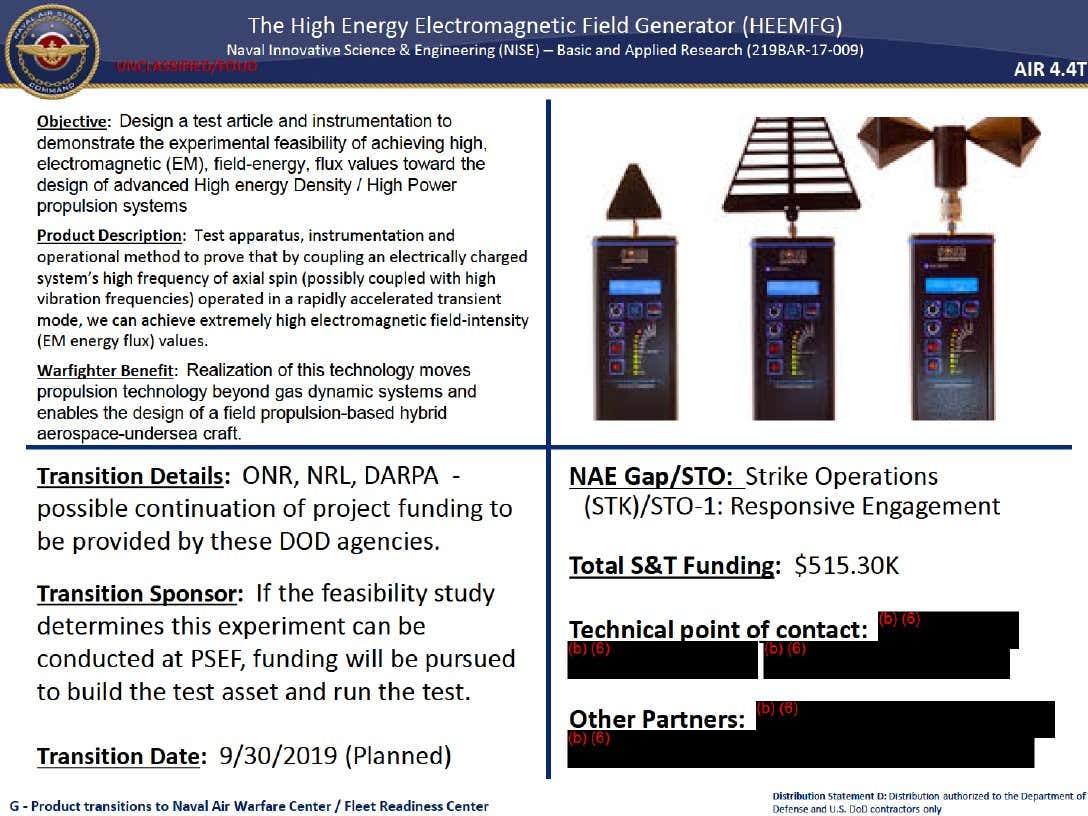
An August 2019 NAVAIR Science & Technology Alignment and Investment Reporting System (STAIRS) report states that "the spin test to evaluate the HEEMFG effect took place in late September 2018" and that while the tests "did not measure any anomalous electromagnetic effects that would satisfy the theory," investigators believe "the reason for this is that the capacitor confined the electrons to its center, rather than the surface, which is necessary for generation of the effect." The report concludes its in its future outlook by noting that "planning has been in progress to compensate for the effect seen on the capacitor in the end of FY2018, with [a] new experimental setup to be completed by July 2019."
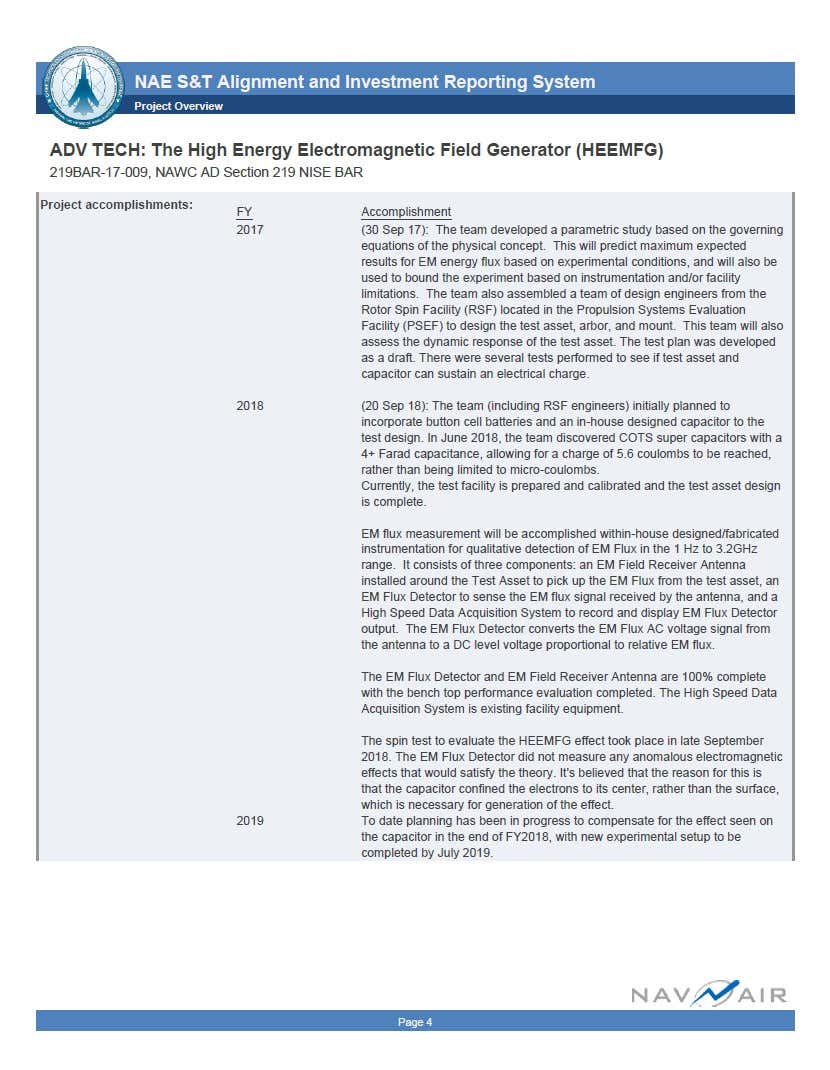
The further our investigation continues, the more it seems like the patents of Dr. Salvatore Pais are exactly what they appear to be: hypothetical applications of theoretical physics the Navy thinks are viable enough to spend hundreds of thousands of dollars on, and possibly much more, to someday be able to master. Yet considering there have been all types of theories, ranging from a government disinformation campaign to alien emulation technology, behind these patents, we still can't say conclusively what is going on here.
Still, taken at face value, these new documents seem to prove even further that these inventions were not solely the product of an enigmatic maverick inventor, but instead received support from the highest levels of NAWCAD and led to DoD-funded research projects and experiments with an eye on producing exotic new forms of propulsion and weaponry. Whether these experiments were the start of a looming energy revolution or a dead-end is yet to be understood, but by the looks of the documentation we have studied, it seems like these experiments were more of a beginning than an end. This is all fascinating as no physicist we have discussed Pais's patents with sees how they are feasible, yet the Navy seems to have thought otherwise and spent considerable funds to explore the ideas in the form of physical experiments.
In light of these new documents, we have already reached out to NAWCAD in hopes of establishing a dialogue about the High Energy Electromagnetic Field Generator and the other Salvatore Pais patents. In the past, they have been unwilling to do so.
We at The War Zone have just begun combing through this huge batch of new documents and we will report more once we have concluded our review of them.
Contact the author: Brett@TheDrive.com
No comments:
Post a Comment
Note: Only a member of this blog may post a comment.